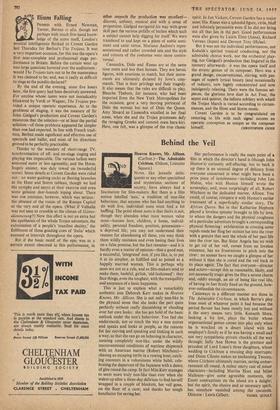Ilium Falling
PRIMED with Ernest Newman, Turner, Barzun et alia, though not perhaps with much first-hand know- s- ledge of the score itself, London's musical intelligentsia flocked to Covent Garden last Thursday for Berlioz's The Trojans. It was a very important occasion, for this was the opera's first near-complete and professional stage per- formance in Britain. Before the curtain went up two large questions hovered over the auditorium : would The Trojans turn out to be the masterpiece it was claimed to be; and, was it really as difficult to stage as the pundits declared?
By the end of the evening, some five hours later, the first query had been decisively answered. For anyone whose tastes were not ineradicably blinkered by Verdi or Wagner, The Trojans pro- vided a unique operatic experience. As to the problems of staging, it was the measure of Sir John Gielgud's production and Covent Garden's resources that the solution—or at least the partial solution—of those problems appeared far simpler than one had expected. In line with French tradi- tion, Berlioz made significant and effective use of spectacle and ballet, and most of his directions proved to be perfectly practicable.
Thanks to the wonders of short-range TV, synchronisation of off- and on-stage singing and playing was impeccable. The various ballets were executed more or less agreeably, and the Horse, bugely sinister, was duly towed on (wonderful scene). Some details at Covent Garden were ruled 'out: no water-gushing rocks or flaming branches In the Hunt and Storm tableau, though we had the nymphs and satyrs at their exercise and even some genuine deer-hounds loping about. There was one omission, however, which was serious : The absence of the vision of the Roman Capitol at the very end of the opera. (What if Valhalla was not seen to crumble at the climax of Gaiter- &Mu:wrung?) Now this effect is not an extra but the apotheosis of the whole Trojan adventure, the culmination of a people's 'manifest destiny,' the fulfilment of those goading cries of 'Italia' which resound at intervals throughout the opera.
But if the basic motif of the epic was to a certain extent obscured in this performance, in other respects the production was excellent— discreet, unfussy, musical and with a sense of proportion. Gielgud navigated his way with great skill past the various pitfalls of bathos which such a subject cannot help digging for itself. We were translated to and kept on a plane of noble senti- ment and antic virtue. Mariano Andreu's repre- sentational and rather crowded sets and the style and colours of the costumes were more contro- versial.
Cassandra, Dido and lEneas are at the same time more and less than human. They are heroic figures, with emotions to match, but their move- ments are ultimately dictated by Jove's com- mands. That is their privilege and their tragedy. It also means that the roles are difficult to play. Blanche Thebom, for instance, who had been imported from the New York Metropolitan for the occasion, gave a very moving portrayal of Dido the woman but not of Dido the Queen. Amy Shuard as Cassandra excelled in her final scene, when she and the Trojan priestesses defy the ravaging Greeks and commit mass hara-kiri. Here, one felt, was a glimpse of the true classic spirit. In Jon Vickers, Covent Garden has a major asset. His /Eneas was a splendid figure, virile, bluff and infinitely persuasive even if he did not bring out all that lies in the part. Good performances were also given by Lauds Elms (Anna), Richard Verreau (lopas) and Dermot Troy (Hylas).
But it was not the individual performances, nor Kubelik's spirited musical conducting, nor the admirable chorus work, nor the orchestral play- ing, nor Gielgud's production that lingered in the memory afterwards : it was the opera itself and the erratic genius of its composer. Here was a grand design, unconventional, stirring, with pas- sages of superb lyrical beauty (and occasionally of tedium), now highly concentrated and now indulgently relaxing. There were the famous set- pieces, the glorious love duet in Act Four, the septet and quintet, the infinite subtlety with which the Trojan March is varied according to circum- stances, and the Hunt and Storm music.
Covent Garden is to be congratulated on restoring to life with such signal success an operatic conception as unique as the composer


































 Previous page
Previous page